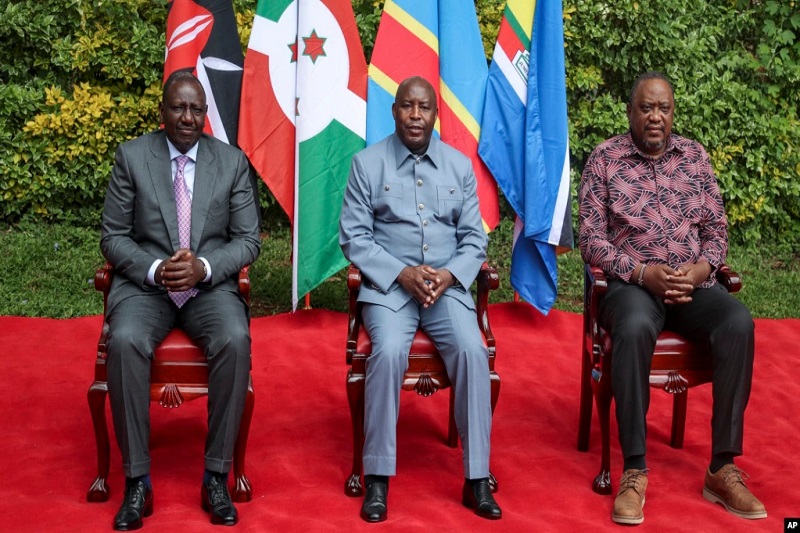Last updated on November 30th, 2022 at 11:38 am
Nairobi, the capital of Kenya, has become the site of the third round of consultations for the peace process in the Democratic Republic of the Congo, which are being facilitated by the East African regional bloc. The goal of these consultations is to discuss reforms that will make it easier for rebel groups to disarm themselves.
The opening session on Monday was attended in person by the President of Kenya, William Ruto, as well as the President of Burundi, Évariste Ndayishimiye. However, the Presidents of Congo, Rwanda, and Uganda participated virtually. The leaders reaffirmed their resolve to help secure a durable peace in the Democratic Republic of the Congo.
The former president of Kenya, Uhuru Kenyatta, is acting as a facilitator for the talks that took place on Monday. He said that the talks were meant to talk about political process and institutional reforms that would make it easier for armed groups in the DRC to give up their weapons, get better, and join society again.
A summit was held in Angola the week prior to this one, and the leaders who attended it urged for a ceasefire to be followed by a rebel pullout from the major towns that are now under the control of the M23 rebel group. Despite the fact that it was not a formal participant in the discussions taking place in Angola, M23 has stated that it will accept the cease-fire agreement. On the other hand, it says that it doesn’t trust the Congolese government to keep its end of the deal and stop the fighting.
Related Posts
Peter Mathuki, the secretary general of the East Africa regional bloc, stated that some of the groups were present in the discussions that took place on Monday, but he did not disclose which ones they were.
During the course of the talks, the facilitator intended to identify the fundamental reasons for the fighting in each of the five provinces of the DRC and address the re-establishment of state leadership in the provinces as a means of easing tensions and promoting peace. The full deployment of the regional troops, which are made up of soldiers from each of the member states, will also be talked about.
As part of the regional force, a battalion of Ugandan troops, two battalions of Burundian troops, and one battalion from South Sudan will eventually join the Kenyan soldiers who have already been sent to the eastern part of the DRC. Kenyatta said that the region could only help the peace process along, but that in the end, it would be the people of the Congo who would have to keep the peace and carry the huge responsibility of doing so.
A decade ago, members of the M23 rebel organization overran Goma, the main city in eastern Congo, which is located close to the country’s border with Rwanda. This event catapulted the M23 rebel group to the forefront of international attention. Following the conclusion of a peace agreement, a significant number of M23’s fighters were incorporated into the national military.
After that, the organization reemerged in November of last year, declaring that the government had failed to live up to the promises it had made over the previous ten years. By the end of June, the M23 rebel group had taken control of the strategically important town of Bunagana, which is located close to Uganda’s border.
The presence of M23 has been a major contributor to the deterioration of relations between the Democratic Republic of the Congo and Rwanda. The current president of Rwanda is of Rwandan Tutsi heritage, while a large number of the rebel combatants hail from the Tutsi ethnic group in the Democratic Republic of the Congo. When it was first established, more than a decade ago, the M23 movement’s primary objective was to defend the civil and political rights of Congo’s Tutsi people. However, many people believe that they are only interested in taking control of the eastern part of the DRC because of the region’s abundant mineral resources.

